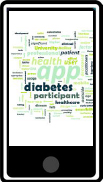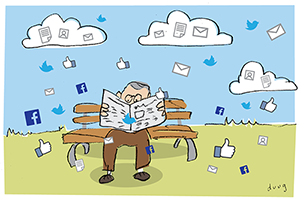
Dangers lurk in the health app jungle
The proliferation of health related apps – more than 3 million available so far, with 200 new ones being created daily - has prompted a warning that the app jungle is almost impossible for consumers to negotiate safely. Moreover, many app products are ineffective or inaccurate, thus exposing users to major health complications as well as posing a privacy risk through personal data being hacked or misused.
According to the Health Informatics Society of Australia, the peak body for the digital health community, the huge number of apps is confusing for consumers who often find it hard to decide which apps are evidence based. An app store search for diabetes apps delivers a plethora of choices that leaves most potential users uncertain and possibly feeling negative about the value of any apps in the self-management of their disease.
- Details

Phone apps can improve diabetes self-management
A study of mobile phone app usage by people with Type 2 Diabetes Mellitus (T2DM) has found that while recommended app usage improves self-management for most users only a minority of patients had practitioners involved in their app use. Further, all non-app users had never had the concept discussed with them by a health professional.
The findings of the study* were said to be “significant for GPs, nurse practitioners and allied health professionals who may integrate apps into a holistic management plan that considers strategies outside the clinical environment.”
The research team from Western Sydney University, The University of Sydney and the University Centre for Rural Health, Lismore (Dr Jane Barker and Dr Sabrina Pit) noted that better incorporation of user-centred features would enhance patient self-management, a significant factor in glycaemic control: “Self-management is considered the most important factor in ensuring well-controlled blood glucose levels (BGL) and, thereby, preventing diabetes complications. It has the potential to ease the burden on the healthcare system by encouraging patient autonomy and allowing disease monitoring outside clinical settings.”
- Details
- Written by: Robin Osborne
FASD is forever, so let’s help make it never
Foetal alcohol spectrum disorder (FASD) is a lifelong condition where diffuse brain injury is caused by antenatal alcohol use. It is thought that the prevalence of foetal alcohol spectrum disorder may be as high of 2 - 4% of the Australian population. The majority of people with the disorder have not been diagnosed. They are, however, accessing their GP regularly as well as seeing other health professionals due to their multiple difficulties. The Australian diagnostic criteria for FASD are now available online.
GPs should consider FASD particularly in children, young people and young adults who have difficulties in multiple areas. People with FASD present with learning and language difficulties and they may have a present or past diagnosis of ADHD and/or Autism.
- Details
- Written by: Dr Jackie Andrews. Community Paediatrician Goonellabah

Treating UTIs in aged care residents
Australia has high levels of antibiotic usage compared to similar high income countries and antimicrobial resistance is now a significant issue for healthcare workers and their patients(1). Urinary tract infections (UTI) are the most common indication for antibiotics in nursing homes and whilst they are mainly used to treat cystitis, they are often used for asymptomatic bacteriuria (ASB) and pyelonephritis(2).
The 2017 Aged Care National Antimicrobial Prescribing Survey (acNAPS) found continuing high rates of inappropriate antimicrobial use in aged care homes(2), presenting an opportunity for all health care professionals to use antimicrobial stewardship practices to optimise antimicrobial usage in nursing homes(1). Furthermore, addressing antimicrobial usage in nursing homes will contribute to an overall reduction of antimicrobials within Australia and reduce the risk of antibiotic resistance.
- Details
- Written by: Alannah Mann, Pharmacist Alstonville

Face-to-Face Not Facebook: Combatting Loneliness with Meaningful Connection
While in some ways we are more connected to each other than ever before, electronic communication is not a substitute for human contact. Facebook and other forms of social media are not for everyone, and, even for those that use such platforms, there is a limit to the emotional satisfaction one can gain from these ‘fast’ and often superficial means of communication.
In recent years, there has been a great deal of research into the effect of technological communication on mental health. Despite there being many positive attributes to these online modes (such as a more democratic representation of voices), they can lack humanity. Email does not conjure the same feeling as posting a letter; even handwritten aerograms sent overseas to loved ones a few decades ago seemed to have more meaning. Similarly, the user-experience of online mass media differs from reading printed copy, and quality journalism seems to have suffered across the board. In turn, as discussed recently on ABC radio, we are seeing a turning away from ‘too-much-ness’ and an ‘attention economy’ with a return to ‘slow journalism’ and more meaningful forms of communication.
- Details
- Written by: Andrew Binns
Read more: Face-to-Face Not Facebook: Combatting Loneliness with Meaningful Connection
Page 67 of 177















